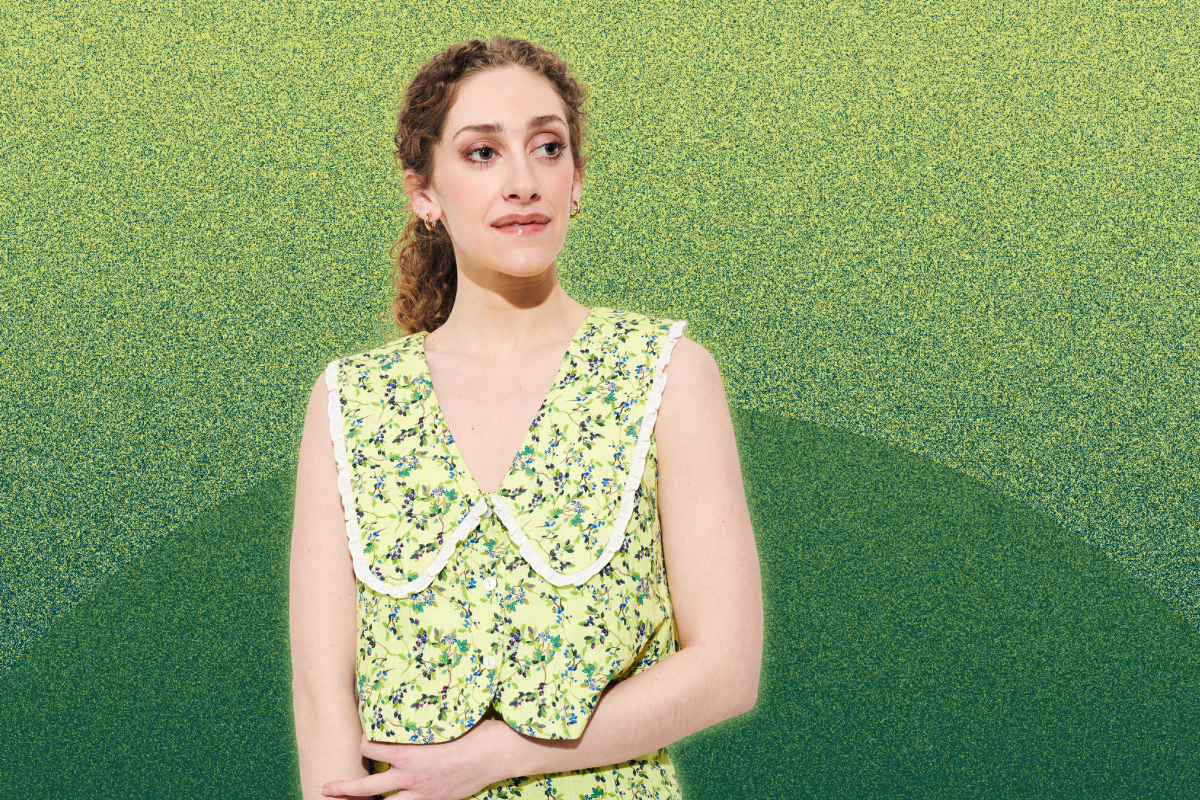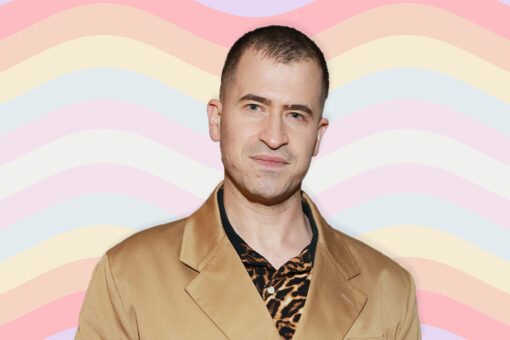When Leo Frank describes his wife Lucille as “meshuggeneh,” she seems more upset that he spoke Yiddish than that he called her a fool. “I can’t understand how God created you people Jewish and Southern at the same time!” Leo exclaims.
“It’s a funny joke that lands in the opening scene of ‘Parade,’ but it’s a tragic foreshadowing of what’s to come,” says Micaela Diamond, who plays Lucille Frank in the Broadway revival of “Parade,” opening March 16 at the Bernard Jacobs Theatre.
“Parade” tells the true story of Leo Frank (played by Ben Platt), a Jewish man in 1913 Georgia who was falsely accused of murdering a 13-year-old Christian girl. The musical, by Alfred Uhry and Jason Robert Brown, originally premiered on Broadway in 1998. It went on to win Tony Awards for Best Score and Best Book. Bookwriter Uhry is himself a Southern Jew whose grandmother knew the real Lucille Frank.
Perhaps that’s why Lucille’s journey towards accepting her Jewish identity is one of the most compelling arcs in the show. Initially, she tries to assimilate into Southern culture. “She’s using her proximity to whiteness as a means of adhering to the safe, dominant culture of that time,” Diamond says. But when Lucille is forced to defend her husband against the murder charges, everything changes: “Lucille was white until she was undeniably Jewish.” (Diamond is careful to point out that Lucille, the descendent of Ashkenazi German Jews, was white-passing, but that not all Jews are.)
Lucille’s struggle is reflected in the show’s musical choices. “The major keys are often Leo’s and then the minor keys often belong to the South [the white, Christian Southerners in the cast],” Diamond explains. For much of Act I, Lucille is caught between the two keys. “I can feel that as an actor inside of me — this struggle of deciding if you can be both, if you can be Southern and Jewish.”
If it weren’t enough to grapple with those identities, Lucille also fights the patriarchy. “Parade” is set in a time when American women couldn’t vote and Jewish women couldn’t read Torah, have bat mitzvahs or become rabbis. “I love that I’m coming into this place where it does feel like I am breaking the glass ceiling of the turn-of-the-20th-century South,” Diamond says, referencing a scene in which Lucille disrupts the governor’s ball to convince him to reconsider Leo’s case. Lucille draws on her Southern and her Jewish qualities here, both dancing elegantly at the ball and re-examining the flimsy evidence against her husband with the scrutiny of a Talmudic scholar.
Getting to play a complex Jewish woman means “everything” to Diamond, who grew up going to a conservative synagogue and went to Israel on Birthright. Although she is hesitant to definitively state that only Jews should play Jewish roles, “if the character is intrinsically Jewish, if they’re telling a story about their Jewishness, it does make a lot of sense to have them be [played by] Jewish people.” She describes herself and co-star Platt as “Jewish kids who love musical theater at our hearts.”
Few shows depict messy, nuanced Jewish protagonists at all, let alone a messy, nuanced Jewish love story. But “Parade” explores the complexities of what it’s like to be a young, married couple with differing perceptions of their Jewish identities. “I don’t want to speak on behalf of anyone, but I think that’s probably a common struggle that couples who are minorities go through,” Diamond says. She can relate. Diamond and her previous partner (also Jewish) didn’t see eye to eye when it came to their Jewishness. “You have to be able to hear each other in order to finally connect.” Ironically, Lucille and Leo discover how to do just that; his trial brings them closer together as Lucille awakens to the realities of what it means to be a Jew.
It frustrates Diamond when Jews are excluded from conversations about the portrayal of marginalized groups onstage. She suggests it might be because Jews are difficult to categorize as a race, an ethnicity or a skin color. “There are so many intersections within this show, which make it gray in the most beautiful way,” she says — “in a way that I think our generation can actually take in, which is exciting to me.”
For example, Lucille has a “complicated” relationship with her housekeeper, a Black woman named Minnie. Diamond finds Lucille and Minnie’s dynamic revealing in terms of “what it means to be a Jewish woman and a Black woman who are fucked over by the same system” — that system, of course, being white supremacy.
“‘Parade’ is this vast intersection of minorities,” Diamond says. “[It’s about] what it means to be pitted against each other and how we can come out of it the other side [having learned] something.”
Unfortunately, some of the harsher lessons from “Parade” feel all too relevant today. Neo-Nazis protested outside the theatre on the night of the revival’s first performance. In response, Platt posted an Instagram video reiterating the importance of telling Leo Frank’s story.
Broadway shows rarely experience protests; previous instances — such as the 1991 opposition to “Miss Saigon” — were often fueled by a desire for inclusivity, not by antisemitism. To Diamond, the protest at “Parade” clarified the bitter truth that antisemitism is everywhere.
“I tend to go immediately to how we all had a fire under our bellies, and we told the story with more love, but it’s different talking to a Jewish woman and a Jewish publication. There’s more room to experience what happened,” she reflects. Diamond has come across as poised and confident throughout our conversation but, thinking back to that night, she begins to tear up — and there’s strength in her vulnerability. “We just have to crumble sometimes,” she acknowledges. “It was scary, and sad, and I felt rage.”
18 members of the “Parade” company made their Broadway debuts that night. The protests marred what should have been a joyous occasion for them. “I hope that Ben and I continue to hold our cast with such a tender hand and allow room for the crumbling,” Diamond says.
She let herself crumble, but she also rose up again and did her show. She made space for her intersecting, conflicting feelings, much in the way that Lucille had to make space for her intersecting, conflicting identities.
“Telling the story is massively important to my heart, and I love doing it every night. The only thing that those protesters did was make me want to tell it over and over and over again.”



